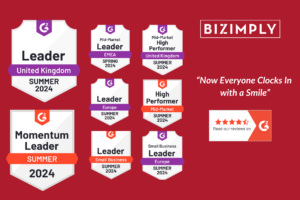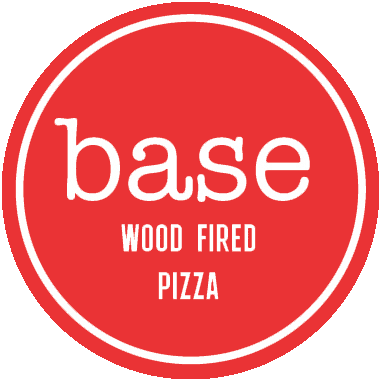Managing shifts in the competitive hospitality space can feel overwhelming for many – one wrong move, and things can quickly spiral out of control.
To take on shift management without tech in 2024 is not just unwise, it may be the difference between success and failure. Without hospitality tech in place, you’re far more likely to fall behind your competitors, and catching up can be incredibly difficult.
That’s where shift management software steps in, making life a whole lot easier for everyone involved. Whether you’re running a fast-paced restaurant or a busy hotel, having the right tools to organise your team’s schedules is key to keeping operations smooth and your staff happy.
In this blog, we’ll go into detail covering the top features you should look for in shift management software, helping you find the perfect fit for your hospitality business.
The Challenges of Shift Management
In general, shift management comes with several challenges, and requires focused management and leadership to get the job done effectively and efficiently. Understanding the challenges that come with shift management can help prepare you for all possible scenarios.
A few of the main challenges of shift management in hospitality includes:
- Managing Employee Availability: Balancing employee availability with the business’s ever-changing demand, especially during peak times.
- Compliance with Labor Laws: Navigating complex regulations regarding overtime, break periods, and maximum working hours to avoid legal issues.
- Preventing Employee Burnout: Maintaining fair scheduling and preventing overwork and burnout, particularly in high-pressure environments with long hours.
- Communication Barriers: Addressing miscommunication or lack of timely updates that can lead to confusion, absenteeism, or double-booking.
- Last-Minute Changes: Handling unexpected absences or sudden changes in demand, which can disrupt the schedule and require quick adjustments.
- Employee Skill Matching: Making sure that shifts are staffed with employees who have the appropriate skills and experience for specific tasks or roles.
- Seasonal Variability: Managing shifts during high and low seasons, where staffing needs can drastically change, requiring flexibility in scheduling.
- Retention and Turnover: Dealing with high employee turnover, which can complicate shift management and increase the need for training new staff.
- Technology Integration: Implementing and effectively using scheduling software to streamline the process, which can be challenging if the team is not tech-savvy.
- Multi-Location Coordination: Managing shifts across multiple locations while maintaining consistent staffing and communication between different sites.
- Employee Preferences: Balancing employee preferences for shifts, such as morning vs. evening, while still meeting the operational needs of the business.
- Cost Control: Maintaining labour costs within budget while making sure that all shifts are sufficiently covered, particularly during periods of high demand.
Why Shift Management Software Matters
With the right shift management software in place, the challenges mentioned above can be easily taken on, and you can quickly streamline operations without sacrificing the quality of your service. Finding the right shift management software isn’t just about keeping track of who’s working when, it’s about setting the foundation for a well-oiled operation.
In the hospitality industry, where last-minute changes and high employee turnover are the norms, the right software can save you countless hours of manual scheduling, reduce conflicts, and even boost staff morale by ensuring fair and balanced shifts.
Scheduling software also helps you stay on top of labour costs, swap shifts instantly, sync employee data, communicate with hospitality staff, avoid scheduling errors, and maintain compliance with labour laws. For restaurants, hotels, and more, these features have become essential.
With hospitality scheduling software, remember, that the right tool simplifies your scheduling process and empowers your team, leading to better service and a more efficient business overall. Without it, you’ll always be one step behind, and a bit more stressed in general.
The Key Features of Shift Management in Hospitality
Now, with plenty of options out there, it’s important to know what you want from shift management software. Let’s run through some of the main features to look out for in the hospitality software solution.
Key Feature 1: User-Friendly Interface
The importance of a user-friendly interface should never be understated. Nobody likes to waste time figuring out how to use something that should be making your life easier.
A user-friendly interface is more than just a nice-to-have feature; it’s key for the smooth adoption of any shift management software.
In a busy hospitality environment, your staff members don’t have the luxury of time to grapple with complicated systems. When the software is intuitive and easy to navigate, employees can quickly learn how to use it, reducing the time and resources spent on training.
With an intuitive interface, the chances of scheduling errors are minimised, as staff members can easily input their availability, swap shifts, utilise communication tools, and check their schedules without confusion.
A simple, well-designed interface ensures that the software becomes a tool that everyone on your team can rely on, rather than an additional burden. A user-friendly software solution makes the scheduling process more efficient while helping your staff maintain a positive work-life balance.
Key Feature 2: Automated Scheduling
Automation has quickly become commonplace in plenty of industries, and hospitality is no different.
Automated scheduling is a powerful feature of scheduling software that can revolutionise how shifts are managed in your organisation.
Most workforce management tools allow you to take the manual effort out of scheduling with automation features, saving you time and energy while improving accuracy and efficiency.
Trying to manually manage shifts drastically increases the chances of an error being made, and everything can quickly become chaotic. As such, finding shift management software with automation features is pivotal.
Let’s look at a few key ways how automated scheduling benefits your hospitality business:
- Time-Saving: Automated systems quickly generate schedules based on predefined rules and employee availability, freeing up your managers from the tedious task of manual scheduling.
- Error Reduction: The system reduces the likelihood of common scheduling mistakes, such as double-booked shifts or missed availability, leading to smoother operations.
- Handling Complex Shift Patterns: Automated scheduling can easily accommodate intricate shift patterns, making sure the right number of staff are assigned to shifts, especially during peak times.
- Legal Compliance and Fairness: The software considers labour laws, overtime limits, and individual employee preferences, helping you maintain fair and compliant schedules that foster employee satisfaction.
Key Feature 3 Leave Management & Time-Off Requests
Whether you’re running a hotel, restaurant, or catering business, having a built-in feature to control leave management and time off requests is incredibly important for both employers and employees, as it streamlines the entire process of managing time off.
For managers, the built-in leave management system offers a centralised way to track and approve leave requests. The software typically provides a visual overview of the team’s availability, making it easier to see who is off and when. Additionally, automated notifications and approval workflows save time and reduce the risk of overlooking requests.
This visibility helps managers avoid scheduling conflicts while maintaining adequate coverage, especially during busy periods. With that in place, the amount of miscommunication is drastically reduced and everyone is constantly on the same page.
Employees can quickly and easily apply for leave via the software and track whether it’s been approved or not. They can also check who’s working today and which shifts, as well as whether any last-minute shift swaps have taken place.
Another significant benefit is the integration with payroll and compliance systems. When leave and time-off requests are managed within the same platform as scheduling and payroll, employees are always paid accurately according to their entitlements.
All in all, giving employers and employees the tools to control leave management helps keep everyone on the same page while promoting a positive and transparent workplace environment.
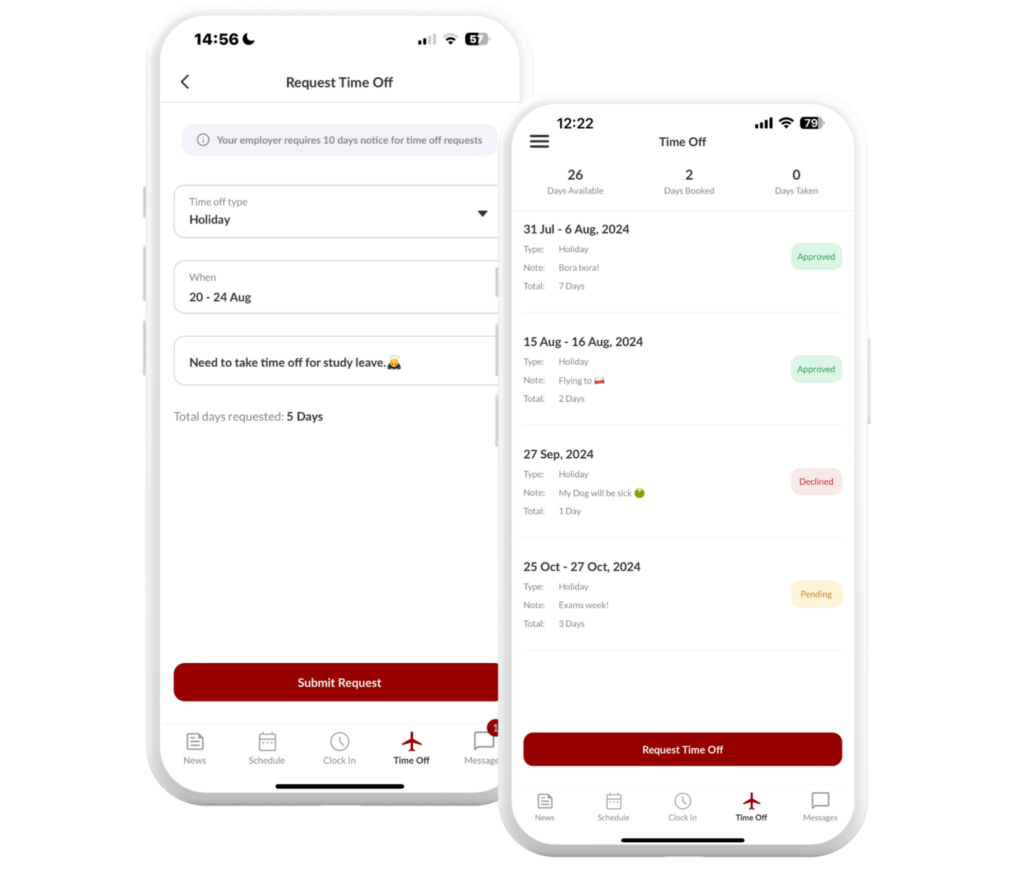
Key Feature 4: Real-Time Communication
As with most things in life, communication is pivotal in the hospitality space. The top software solutions often include robust communication tools
Wide-ranging and impactful communication features in shift management software can greatly improve team collaboration, allowing for quick and clear exchanges of information.
Whether it’s a last-minute shift change, an urgent announcement, changes in general employee scheduling, or a request for shift swaps, real-time updates keep everyone updated. This not only reduces misunderstandings but also keeps everyone aware of any changes as they happen, preventing potential disruptions to service.
When you foster open and immediate communication, the software helps create a more connected and responsive team, which is vital for maintaining high levels of customer service. And of course, with transparent communication systems in place, employees are far more likely to perform.
The key components of good communication tools include:
- Instant Messaging: Allows staff and managers to communicate directly within the platform, making it easy to discuss shift details, address issues, and coordinate changes without leaving the software.
- Shift Notifications: Automatically informs employees about schedule updates, new shift assignments, or changes, keeping them up-to-date with their work schedules.
- Alerts: Sends notifications about important updates such as open shifts, shift swaps, or urgent changes, allowing staff to respond quickly and manage their schedules effectively.
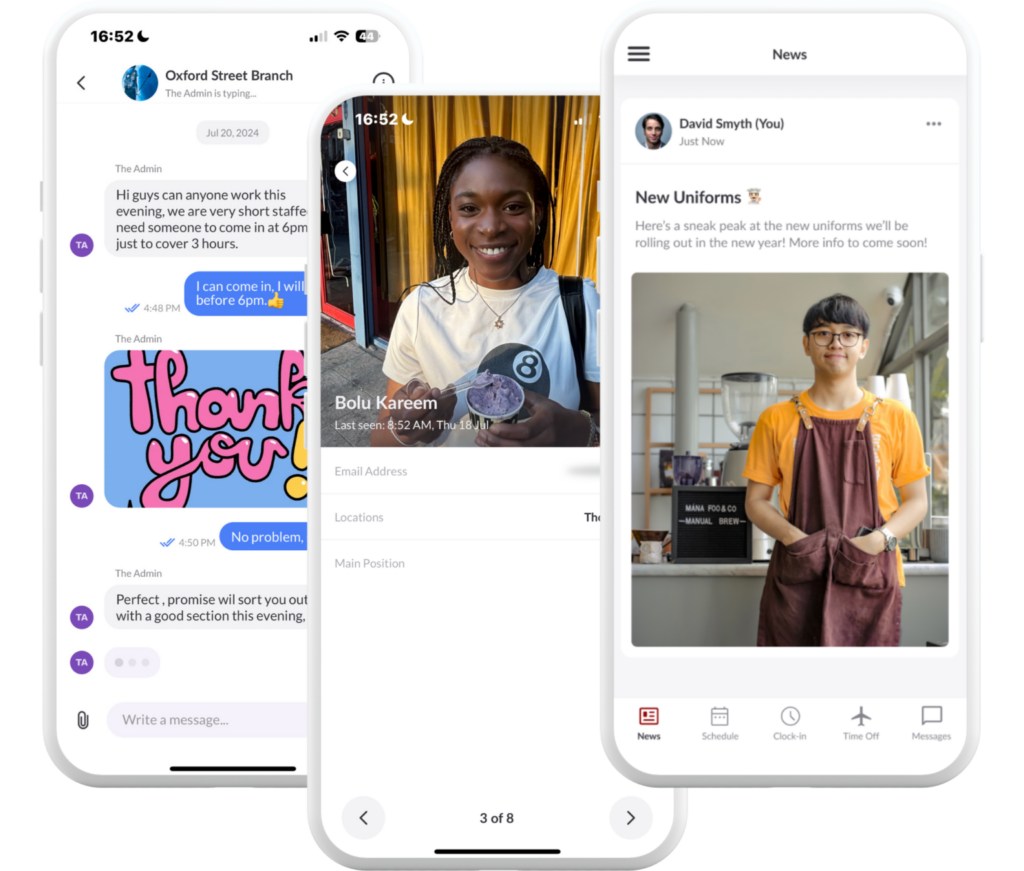
Key Feature 5: Mobile Accessibility
On-the-go management is where managers and staff are constantly on the move. In 2024, having mobile accessibility is no longer a nice extra, it’s a necessity.
Mobile-friendly shift management software allows your managers and employees to access their schedules, make changes, and communicate with the team anytime, anywhere. This flexibility is crucial in an industry where last-minute adjustments are common, and being able to manage shifts on the go can make all the difference in keeping operations running smoothly.
Mobile accessibility helps keep everyone connected and informed, whether they’re on the floor, in the kitchen, or even off-site.
A few of the key benefits of using a mobile-friendly software solution include:
- Convenient Access to Schedules: Your employees can quickly check their schedules, confirm their shifts, and see who they’re working with directly from their smartphones, reducing the need for constant back-and-forth with managers.
- Shift Management on the Go: Managers can easily update schedules, approve shift swaps, and respond to availability requests while away from their desks.
- Instant Communication: Mobile apps often include communication tools that allow staff to message managers or colleagues instantly, making it easier to coordinate shifts and handle any issues that arise during the day.
- Increased Employee Engagement: When your staff members can manage their schedules on their terms, they feel more in control of their work-life balance, leading to higher job satisfaction and lower turnover rates.
- Real-Time Updates and Notifications: Employees receive real-time alerts about any changes to their shifts, ensuring that they are always aware of their responsibilities, even if plans change at the last minute.
Mobile accessibility gives both managers and staff the tools to stay on top of their schedules and communicate with ease, making it a vital feature in any shift management software designed for the hospitality space.
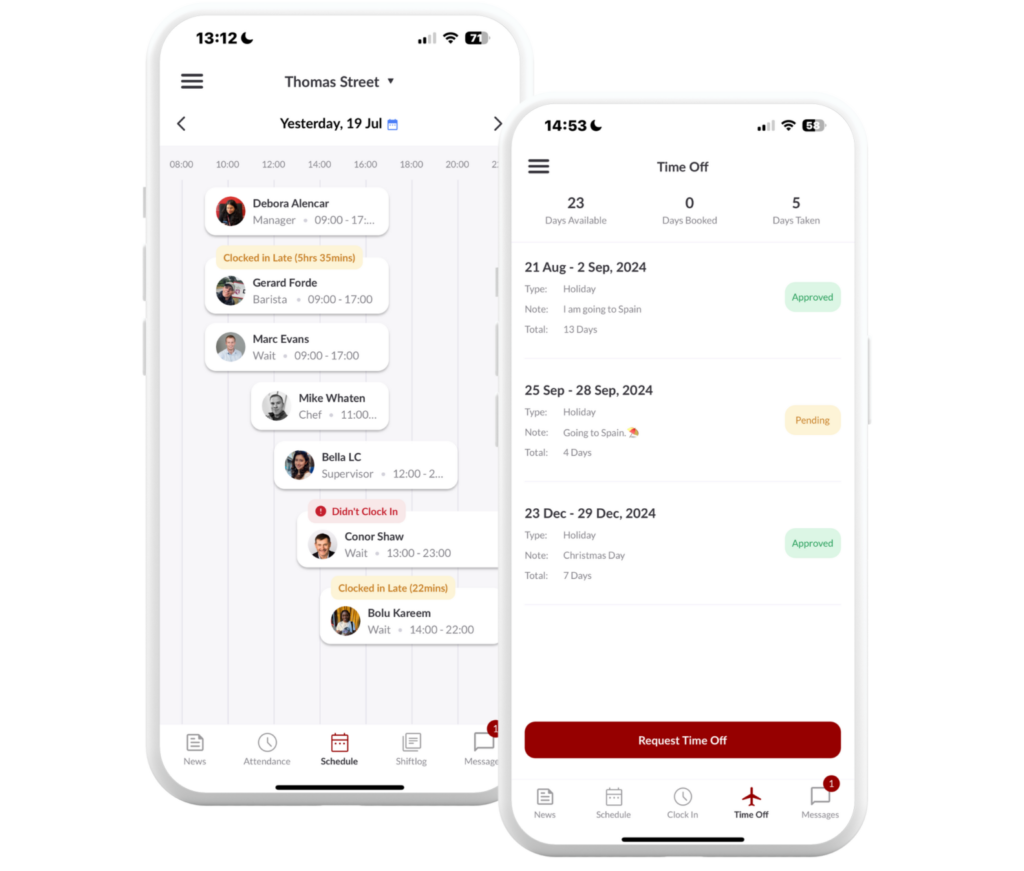
Key Feature 6: Compliance Management
Compliance management is another core aspect of running a successful hospitality business, especially when it comes to labour laws and regulations. Failing to comply with regulations can lead to hefty fines and disruptions, so it’s best to have all the right preventative measures in place.
In an industry with diverse employee schedules, varying hours, and often complex labour requirements, keeping track of compliance manually can be an overwhelming and error-prone process.
This is where shift management software with powerful compliance features becomes indispensable. These tools help keep your scheduling practices in line with legal standards, protecting your business from potential fines, lawsuits, and other legal issues.
- Automatic Tracking of Labour Laws: The software can automatically track and apply relevant labour laws, such as overtime rules, minimum rest periods between shifts, and maximum work hours. As such, schedules are created in compliance with both local and national regulations, reducing the risk of unintentional violations.
- Upholding Fair Work Practices: Compliance features help maintain fair scheduling practices, such as preventing favouritism and keeping shifts distributed equitably among employees. This not only keeps you within legal boundaries but also fosters a fair work environment, which is essential for employee morale and retention.
- Overtime Management: The shift management software can monitor and alert you to potential overtime situations, allowing you to adjust schedules before they lead to costly overtime pay or violations of overtime laws. This proactive approach helps control labour costs while staying compliant with regulations.
- Audit Trails and Reporting: Many compliance-focused shift management tools offer detailed reporting and audit trails, providing a clear record of scheduling decisions and ensuring transparency. This can be invaluable if your business is audited or if you need to provide evidence of compliance.
- Employee Rights and Preferences: The software can also factor in employee-specific requirements, such as accommodations for health issues, religious practices, or other personal considerations. By respecting these preferences and legal rights, you can avoid discrimination claims and create a more inclusive workplace.
- Real-Time Compliance Alerts: Some software solutions offer real-time alerts when a schedule violates a labour law, allowing managers to make immediate corrections. This feature maintains compliance at all times, even when schedules need to be adjusted on short notice.
Compliance management is not just about avoiding penalties, it’s about creating a fair, legal, and transparent work environment.
With the right shift management software, you can navigate the complexities of labour laws with confidence, helping to maintain compliance while supporting the well-being of your employees.
Key Feature 7: Reporting and Analytics
For anyone running a hospitality business, where margins can be tight and operational efficiency is key, having access to detailed reporting and analytics is invaluable.
Shift management software with robust reporting tools allows you to track and analyse various aspects of your scheduling processes, offering insights that can drive smarter decision-making overall.
With all of these key insights, you can optimise your operations going forward, helping to reduce costs and improve overall productivity.
The main benefits of having reporting and analytics features included are as follows:
- Tracking Shift Patterns: Reporting tools allow managers to identify patterns in shift coverage, such as which days or times are consistently understaffed or overstaffed.
- Monitoring Labour Costs: One of the most significant expenses in hospitality is labour. With detailed reports on labour costs, including overtime, regular hours, and holiday pay, managers can gain a clearer understanding of where their money is going.
- Evaluating Productivity: Analytics can also provide data on employee productivity, showing how effectively your staff is being utilised during their shifts.
- Optimising Scheduling: With data-driven insights, managers can fine-tune their scheduling practices. For example, if reports show that certain shifts consistently result in higher sales or better customer feedback, you can make sure that those shifts are staffed with your most experienced employees.
- Forecasting and Planning: Advanced analytics can help predict future staffing needs based on historical data. For instance, if you know that certain events or seasons typically require more staff, you can plan your schedules accordingly.
- Compliance and Legal Reporting: The ability to generate reports on compliance-related metrics, such as break times, overtime, and shift lengths, ensures that your business is adhering to labour laws.
- Employee Engagement and Satisfaction: Reporting and analytics aren’t just about numbers—they can also provide insights into employee engagement. For example, by analysing data on shift preferences, managers can create schedules that better align with employee needs, leading to higher job satisfaction and reduced turnover.
With impactful reporting features, your company can make informed decisions that improve both operational efficiency and employee satisfaction.
Key Feature 8: Integration with Other Systems
The tech you adopt into your business should be able to integrate with your already existing systems. For instance, if you already have a POS system in place, you’ll want your new shift management software to be able to integrate with your POS system to avoid potential disruptions seamlessly.
In general, you’ll want your shift management solution to have integration capabilities with:
- POS Systems
- CRM Systems
- HR Management Systems
- Payroll Software
- ATS Systems
- Training & Onboarding Software and
- Business Intelligence Solutions
With robust integration features, you can quickly and easily connect to all of your existing tech. A few of the main advantages of integration include:
- Streamlined Operations: Integration with other systems (e.g., POS, payroll, and HR) reduces the need for manual data entry, making processes more efficient.
- Real-Time Data Sync: Ensures that shift schedules, employee availability, and labour costs are updated in real time across all connected systems.
- Improved Accuracy: Minimises errors related to data entry and payroll calculations by syncing information directly from integrated systems.
- Enhanced Reporting: Provides comprehensive reports by consolidating data from multiple sources, leading to better insights and decision-making.
- Simplified Communication: Facilitates seamless communication between different departments (e.g., HR, finance, and operations) by integrating with communication tools and platforms.
- Better Compliance: Helps maintain compliance with labour laws and company policies by automatically updating and managing scheduling rules and regulations.
- Increased Flexibility: Allows for customisation and adaptation to specific business needs by integrating with various third-party applications and tools.
- Cost Savings: Reduces administrative costs and operational inefficiencies by automating and streamlining processes through integration.
The Benefits of Shift Management Software Summed Up
To sum up, the benefits of shift management are plentiful and impactful. All in all, shift management software offers the following benefits for hospitality businesses:
- Optimised Scheduling: Quickly create and adjust staff schedules, reducing overstaffing or understaffing.
- Real-Time Updates: Instantly communicate schedule changes or shift swaps, reducing confusion and no-shows.
- Labour Cost Control: Track labour costs and optimise staffing levels to stay within budget.
- Employee Satisfaction: Allow staff to set availability, request time off, and swap shifts easily, improving morale.
- Compliance: Keep shifts in compliance with labour laws and company policies, reducing legal risks.
- Reporting and Analytics: Access shift patterns, labour costs, and employee performance data for better decision-making.
- Mobile Access: Enable staff to view schedules, request changes, and receive notifications on the go via mobile devices.
- Streamlined Communication: Centralise communication, reducing the need for multiple channels and minimising miscommunication.
- Reduced Administrative Work: Automate scheduling processes, freeing up management time for other tasks.
- Improved Customer Service: Guarantee the right number of staff is always available, enhancing customer experience.
What We Offer at Bizimply
Whether you’re a hotel operations manager, restaurant owner, or head of catering, we have powerful workforce management and scheduling software tools to help you take your hospitality business to new heights.
Our tools features include:
- Shift Management (Operations Management and Shift Control)
- Scheduling (Automated Scheduling)
- Time-Clock (Tracking Hours & Attendance)
- HR Management (Frontline Staff Management)
- E-Signature (Document Management)
- Bizimply Connect (Team Communication Tools)
Our platform is known for its user-friendly interface, which allows managers to create and adjust schedules easily, track employee hours, and ensure compliance with labour laws.
The Bizimply platform also integrates with various POS systems, payroll software, CRM systems, kitchen management systems, and more, making it a comprehensive solution for any hospitality business looking to streamline workforce management processes.
With our platform, you’ll also get access to real-time insights and reporting, enabling business owners and managers to make informed decisions based on accurate data.
Final Thoughts
By reviewing the key features of shift management software like user-friendly interfaces, real-time communication tools, integration capabilities, compliance management, and robust reporting, you can guarantee that your chosen software not only meets your current needs but also adapts to future growth.
As the hospitality industry continues to evolve, investing in the right technology will set your business apart, helping you to provide exceptional service while maintaining a well-organised and motivated workforce.
At Bizimply, we help you simplify employee rotas, manage time and attendance, optimise labour costs across multiple locations, and help your managers make the right decisions. Don’t hesitate to book your free demo today.

